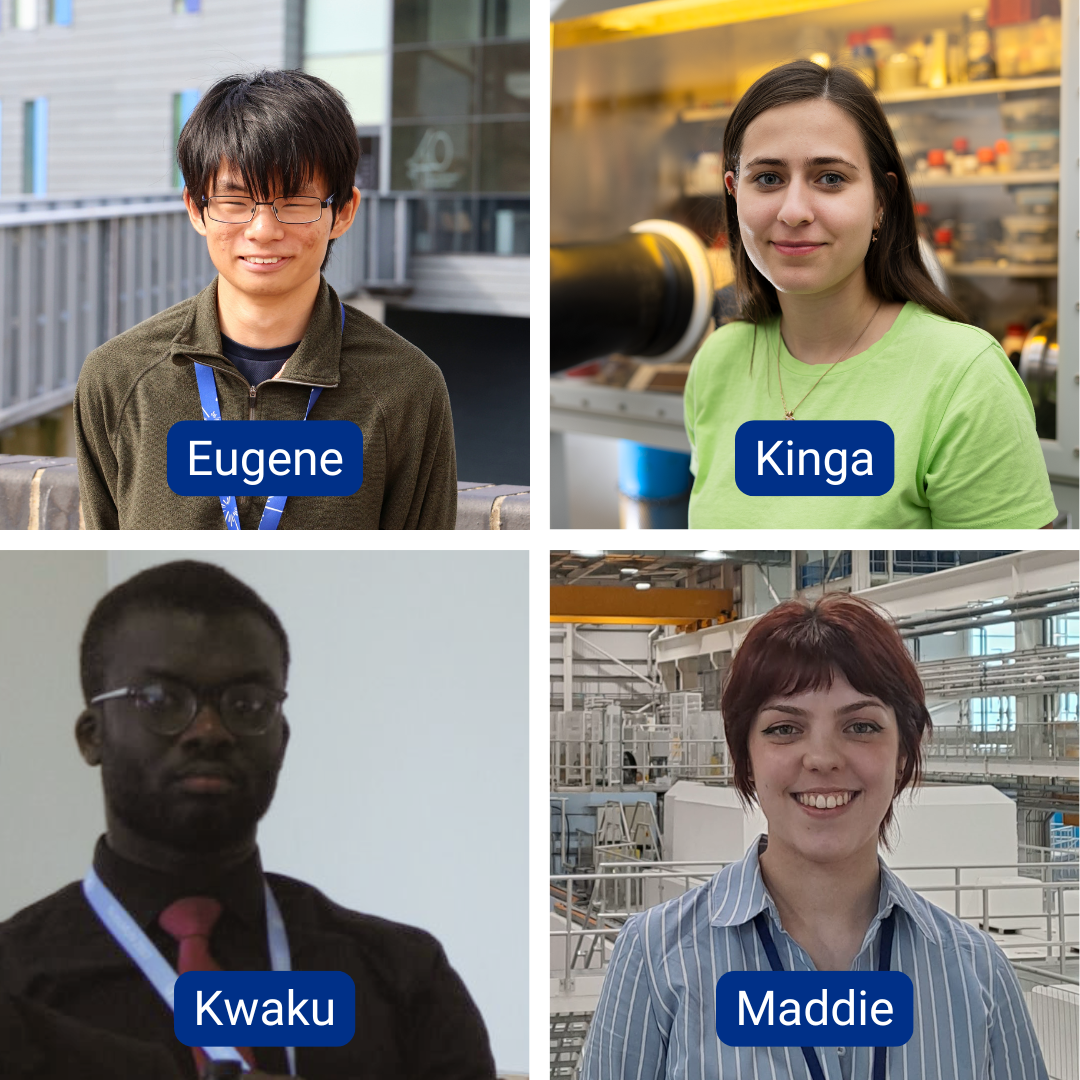 Eugene
Eugene studies Computer Systems Engineering at the university of Warwick, and is the current ChipIr placement student, working on Cosmic Ray Effects on Electronics at ISIS.
Kinga, a Materials Science and Engineering student at Imperial College London, is working at ISIS as a Materials Characterization Laboratory Method Developer.
Kwaku studies Physics with Computing at Loughborough University, and this year will be working at ISIS in Novel Diffraction Methods on the Engin-X instrument.
Maddie is at Newcastle University, where she studies biomedical sciences, and is spending her placement year at ISIS working as our Public Engagement placement student.
Eugene
What does your role involve?
At the moment I'm working on improving ChipIr's existing SRAM-based neutron monitors, making it so we can extract data from them much more quickly. As for what I'll do afterwards, I don't know yet; I guess I'll see!
What is your favourite part of your placement so far?
Probably seeing all the instruments in TS1 and TS2 and seeing the ChipIr beamline in action!
Why did you apply to work at ISIS?
It looked like a really exciting place to be! Being able to work on things that go beyond what I'd do at university and contributing to the research that happens here is something that I couldn't turn down!
What do you hope to gain from your placement?
I hope to learn a lot more of the physics behind what ChipIr does and investigates, as well as getting a better idea of what I'd like to do after I graduate.
Kinga
What does your role involve?
I work with multilayer ferromagnetic thin films, and I characterise their properties. Once my experiment is complete, I will have the opportunity to perform measurements with it on POLREF, one of ISIS’ instruments.
What is your favourite part of your placement so far?
Currently, I am very excited about learning new characterisation techniques like the X-ray Reflectometry, Superconducting Quantum Interference Device or Magneto Optic Kerr Effect. Also, I am really enjoying meeting new people and other placement students and gaining new skills (technical and non-technical) from each other.
Why did you apply to work at ISIS?
I love materials characterisation, it is my favourite part of my whole degree. I was very excited about gaining working experience in a field that I am very passionate about before deciding the next step in my career.
What do you hope to gain from your placement?
I hope to be a critical member of the Support Labs Group and hope to strengthen my focus on finding innovative and effective ways to implement social good into research and innovation. My goal is to further develop my skills in new materials characterisation methods, like developing a Ferromagnetic Resonance experiment merged with Polarised Neutron Reflectivity where I can work individually as successfully as in a team.
Kwaku
What does your role involve?
The job description says, “develop new methods to analyse the kinds of data collected on this instrument”. What this really means is a lot of time in front of a computer using different methods to analyse and fit diffraction data, finding all the different ways we could interpret and use that data.
What is your favourite part of your placement so far?
Observing real scientists doing real research. It reminds me these are all people like me, fumbling around and seeing what works.
Why did you apply to work at ISIS?
From the description, the idea of working on a Particle Accelerator in something that seemed quite applicable and attainable by my knowledge excited me.
What do you hope to gain from your placement?
A broader understanding of how to apply the Physics I’ve learnt in school to the real world. Many of the users are related to engineering in some way, and seeing the different ways they apply this to their work is always interesting.
Maddie
What does your role involve?
Promoting ISIS science and engineering, STEM subjects and careers to a range of audiences, including school students and general public, through a range of channels including events (in-person and online), exhibitions, education activities, websites and social media.
What is your favourite part of your placement so far?
My favourite part of my placement so far has been going to Cardiff for a science communication conference and designing projects that I will be working on this year.
Why did you apply to work at ISIS?
I applied to work at ISIS because I am interested in the research being done here and am keen to promote it to the public to make science more accessible.
What do you hope to gain from your placement?
With this placement I hope to develop my public speaking and engagement skills and learn how to effectively communicate complex science. I am looking forward to participating in outreach projects and public events.
